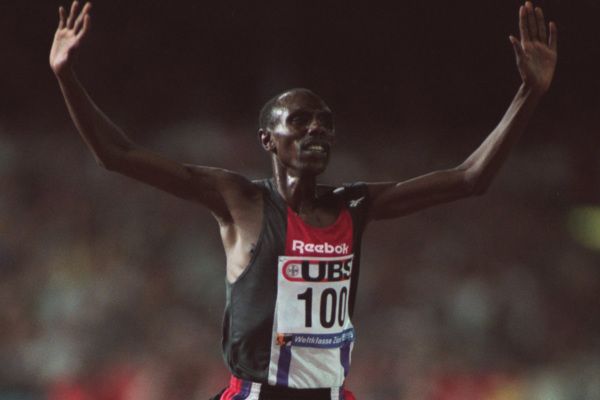There can have been few more beguiling evenings at the summit of track and field than the one Moses Kiptanui experienced in Zurich 30 years ago.
At 9:13pm on 16 August 1995, the Kenyan crossed the finish line in the Letzigrund Stadion with a place in the history books of the sport: as the first man to break eight minutes in the 3000m steeplechase.
He did so in stunning fashion, whipping the Weltklasse crowd into a state of frenzy as he completed a tour de force solo effort by blazing the final circuit – four fixed barriers, water jump and all – in a breathtaking 1:00.10.
As the trackside clock flashed 7:59.18, up in the television commentary tribune, Steve Ovett – a six-time world record-breaker – proclaimed: “That is one of the greatest performances anyone has ever seen in the history of athletics. The four-minute mile was a barrier, but the eight-minute mark for the steeplechase – a run virtually gun to tape by this man – is absolutely magnificent.”
“I never thought I would see that”
Kiptanui was still basking in the afterglow of his magnificent achievement when his world record for 5000m was not so much eclipsed as obliterated 85 minutes later.
Reeling off the equivalent of three 4:05 miles in a 12 and a half lap display of mesmerically metronomic speed endurance, Haile Gebrselassie crossed the same finish line in 12:44.39.
In doing so, the imperious Ethiopian lopped a chunk of 10.91 from the world record figures Kiptanui had established at the Golden Gala in Rome on 8 June, running 12:55.30.
Haile Gebrselassie celebrates his world 5000m record in Zurich (© Getty Images)
An awestruck Ovett exclaimed: “12:44 for the 5km! I never thought I would see that in my lifetime.”
Kiptanui looked somewhat stunned himself as he summoned a smile and strode on to the track to generously embrace the man whose record he had broken in the Italian capital nine weeks earlier.
Such is the double-edged nature of life in the world record-breaking business.
At the Bislett Games in 1980, Sebastian Coe enjoyed less than an hour as the holder of four global marks, having broken Rick Wohlhuter’s 1000m time, before he lost the world mile record to his great British rival Ovett (temporarily, as it proved).
Gebrselassie’s gobsmacking 5000m brought his tally of world records and world bests to four. It would ultimately rise to a staggering 27 – on the track and on the roads, indoors and outdoors, at distances ranging from 2000m to the marathon.
At 22, he had already claimed two of his four world 10,000m crowns in a collection of global titles that would also include two Olympic 10,000m golds, plus world indoor titles at 1500m and 3000m.
To be towed or not to be towed
For Kiptanui – two years the senior of his East African rival at 24 – that night in Zurich would prove to be the zenith of his own exceptional career.
It was to be the last of the seven global marks he achieved, his two world records in the 1995 outdoor season having been preceded by three at 3000m (two indoors), by a world best at two miles, and by the preceding 3000m steeplechase world record of 8:02.08 that he set in Zurich in 1992.
It was almost by chance that Kiptanui became a trailblazing steeplechaser.
Winner of the world U20 1500m title in Plovdiv in 1990, in a championship record of 3:38.32, he was looking to make a mark as a metric miler on the European circuit in 1991 when his manager Kim McDonald – a boyhood rival of Coe – told him there would be no lane for him in the 1500m at the DN Galan meeting in Stockholm.
He accepted a spot in the 3000m steeplechase that was so “last minute” his name didn’t appear on the start list and the poor stadium announcer had no idea of the identity of the youngster who stormed to victory ahead of Olympic champion Julius Kariuki – within striking distance of Peter Koech’s world record figures, 8:05.35.
Three months later, Kiptanui was the world champion in his new event – triumphing in Tokyo ahead of his fellow Kenyan Patrick Sang.
Having also prevailed ahead of Sang in Stuttgart in 1993, he completed his hattrick in Gothenburg the week before the 1995 Weltklasse – easing off on the final lap and still winning by five seconds in 8:04.16.
With a $50,000 bonus and 1kg gold bar on offer in Zurich, the world record-breaking could wait five days.
Kiptanui desisted the offer of pacemakers. “I don’t want a pacemaker. I’ll do it myself,” he said. “I want to do something people will remember forever”. He hared off on his own from the start, passing 1000m in 2:41.25 and 2000m in 5:13.84.
He left his 15 rivals standing from the start, winding up the pace with kilometre splits of 2:41.3, 2:40.9 and 2:37.0.
“To be the first man under eight minutes is more important to me than winning the gold medal at the World Championships,” he said.
“I didn’t want any pacemakers. I don’t like to have anyone in front of me. It’s better to clear the barriers as the leader.”
By contrast, Gebrselassie was happy to be towed to 3400m by his Ethiopian compatriot Worku Bikila before cutting loose with a 4:00.4 last mile.
“I knew I was ready to run under 13 minutes,” he said, “but even I’m surprised by how much.”
Simon Turnbull for World Athletics Heritage

